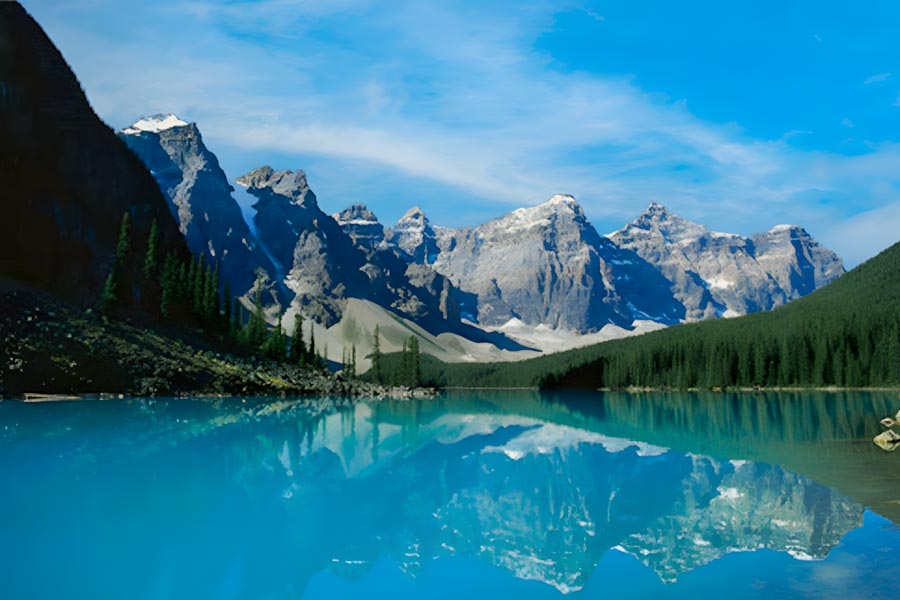Tianshan Mountain, Xinjiang

Chinese name: 天山 (Tian Shan).
Location: Lying across the middle area of Xinjiang Uygur Autonomous Region.
Ticket: CNY200 (including transfer by tourist bus in the scenic area).
Opening time: 09:00-20:00.
Best time for visit: June to August.
How to get there: Regular buses to Heavenly Mountain Scenic Area are available at the gate of People's Park (人民公园, Ren Min Gong Yuan) and Red Hill Hotel (红山宾馆, Hong Shan Bin Guan). The drive takes about two hours.
Travel tips:
1. There is temperature difference in day and night in the area, so it is still necessary to take along a coat or woolen sweater to keep warm in summer.
2. December to February is a freeze-up season frequented by gales in Heavenly Mountain, so it is suggested to go earlier than December or later than February for those planning to watch snow scene there.
3. It is suggested to check weather forecast before departing to Heavenly Mountain in case of sandstorm or snowslide.
Introduction to Heavenly Mountain Scenic Area
The Heavenly Mountain is a tremendous mountain range located in the east of Central Asia area, stretching approximately for 2.5 km from Xinjaing of China westwards to Kazakhstan at an average elevation of some 5000 meters. Tomor Peak (7435.3 m) is its highest peak and Khan Tengri (6995 m) and Bogda (5445 m) are other two famous peaks of it. Divided Xinjiang into two parts – the Tarim Basin in the south and the Junggar Basin in the north, the Heavenly Mountain is also the source where water of Syr Darya River, Chu River and Ili River comes from.
Bogda Peak
Located about 70 km from Urumqi, Bogda Peak is not only an amazing tourist site but also a challenge to conquer for climbers. Snowcapped all year round, the peak is hailed as Sea of Snow by the local and is famous for being where the picturesque Heavenly Lake locates. It is the highest peak of Bogda Mountain, which is the eastern range of Heavenly Mountain. By the sides of Bogda are two lower peaks and the three shape a Chinese traditional pen holder, but in fact they are respected as sacred peaks in the area.
Flora and Fauna in Heavenly Mountain
Apart from a mass of breathtaking natural scenery, Heavenly Mountain is also a natural home to many animals and plants. Argali sheep, snow leopards, lynxes, Heavenly Mountain deer and gazelles living in Heavenly Mountain are under protection of government and the marmots and otters living here are the main source of exported fur of Xinjiang. Goshawks, which look like small airplanes with a pair of unfolding wing over 2 meters, are a kind of fierce bird in the area. Some weak animals such as rabbits and Mongolian gazelles can hardly escape when attacked by goshawks. Wild camels are the timidest but alertest animals here. They have a big stomach which can hold 70 kg of water, with which they do not need drink for months. Besides, there are also roe deer, snow cocks and some other wild animals living in Heavenly Mountain.
In most area below 3000 meters in Heavenly Mountain such as the foot and the river valley areas of Tomor Peak and Bogda Peak, spruces and pines remain green throughout the year. The dense forest in the southern and northern sides of Tomor is one of the main wood-producing areas of Xinjiang. So far, more than 80 kinds of medicinal plants such as fritillary bulb, lithospermum, henbane, sealwort, leonurus and Chinese rhubarb have been found in the grassland and the sylvosteppe of Heavenly Mountain. On the other hand, it is a natural gene pool of fine pasture with 55 kinds of plants of grass family as well.
Saussurea Involucrata in Heavenly Mountain
Saussurea Involucrata, or commonly called Snow Lotuses of Heavenly Mountain, is a kind of perennial herbaceous of composite family growing on precipices, tills and in gaps of rocks 4000 above the sea-level. The hard natural conditions stops most plants growing there with Saussurea Involucrata but make this rare and precious kind of plant "King of Chinese Medical Herbs" due to its medicinal effect in traditional Chinese medicine.
Quick Questions
Our team is waiting for your questions. Please feel free to ask us any questions you might have about our China package tours, Chinese culture, or the sites available. We will gladly help you with any special needs you might have and all questions, like our trip designing is completely free of charge.




